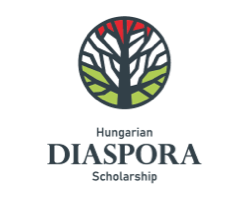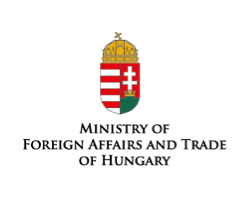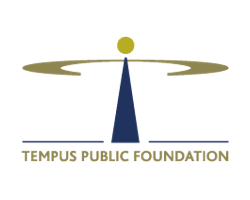
2025-06-23
Many consider medical studies to be one of the most demanding and challenging academic paths. For Levente, his commitment to the medical field and his Canadian-Hungarian heritage inspired him to become a student at the University of Pécs, where he began his medical studies in Hungarian. In our interview, he shares the challenges he faced, his journey of language development, and how using Hungarian has become a natural part of his everyday life.
Could you share a bit about your background and Hungarian heritage? How has your upbringing influenced your connection to the Hungarian language?
We always spoke Hungarian at home because preserving the language and culture was very important to my mom. As a child, I learned Hungarian and English simultaneously, though I was initially more confident in English. I learned a lot of folk songs from my grandparents, and only spoke Hungarian with them. The Hungarian scouting and the Hungarian community in Calgary also played a significant role in deepening my connection with the language. Although I only started speaking fluently in recent years, Hungarian has always been an important part of my life.
Medicine is a demanding field of study. Did you have any particular method of mastering Hungarian terminology alongside your regular coursework?
Since I’m studying in a Hungarian-language program, the medical terminology was already part of the basic curriculum. Latin terms often resemble their English equivalents, and most Hungarian medical terms are part of everyday language. While there were specific words like szederjes (‘cyanotic’) or tályog (‘abscess’) that I learned in class, more complex terms like szívelégtelenség (‘heart failure’) or agyvérzés (‘stroke’) were easy to figure out.
Your roles as a teaching assistant and demonstrator involve teaching in both English and Hungarian. What has been the biggest challenge of teaching in Hungarian?
In the English program, it’s still required to study medical Hungarian for four semesters, which I’ve also taught. Teaching medical Hungarian helped me understand grammar better, and while I haven’t mastered every rule, I’ve found explanations for many peculiarities.
The biggest difficulty was encountering unfamiliar concepts, such as the distinction between front and back vowels. My gaps in grammar knowledge made it hard to explain things I took for granted. In other subjects, the challenge was diving deep enough to convey the material effectively.
Volunteering as a translator in the Sziget Festival’s medical tent can be a high-pressure, fast-paced experience. What did this teach you about using Hungarian in such practical, real-world situations?
I’d say I learned much more about using Hungarian in practical, real-life situations from living in Pécs, attending classes, and running daily errands over four years than I did at Sziget. Still, the festival helped develop my communication skills significantly. I learned to condense a patient’s lengthy explanation into a concise summary for the attending nurse or doctor. Deciphering slurred speech from intoxicated patients or those under the influence of drugs was another skill I developed in both English and Hungarian. Using the language in such a specialised environment is very different from everyday use, but it taught me a lot that I can apply in clinical settings and medical practice.
Looking back, how has studying in Hungarian shaped the way you think, speak, or even feel about the language compared to when you first arrived?
Although the progress has been gradual, I’ve been studying Hungarian for nearly four years and no longer feel uneasy about talking to strangers. Initially, I made a conscious effort to speak Hungarian, but now I switch effortlessly between the two languages. At the faculty, there are both English and Hungarian programs, which help me connect with peers in both languages.
Living in Pécs for four years and being involved in university life, I’ve had the chance to reconnect with distant relatives, and it’s been such a rewarding experience. One of my most memorable moments was during a trip to Budapest with my extended family. We spent the day walking around the city, reminiscing about our shared history, and it made me feel deeply connected to my Hungarian roots.
I’m grateful to my mom for teaching me Hungarian, so I can study in Pécs not just as a visitor but as a Hungarian student.
It’s a good feeling when people are surprised I didn’t grow up in Hungary and compliment my language skills. Reading is no longer an issue, and my spelling has improved a lot. Writing official letters is still a challenge, but I usually ask for help with that. The formal and informal forms of address still cause some uncertainty, but I try to pay attention to them. Overall, I feel much less unsure about using the language. While there’s still room for improvement, I’m proud to use it.
Levente’s example shows how language learning can be a path that not only supports academic and professional advancement but also strengthens the sense of belonging to a community. If you’d like to explore the beauty of the Hungarian language, the “Practice Your Hungarian” online course could be the perfect starting point for you. Whether you’re a beginner or looking to deepen your existing knowledge, the course’s practical lessons and expert guidance will provide you with all the tools you need to become a confident speaker. Don’t wait any longer – start your Hungarian language adventure today!






